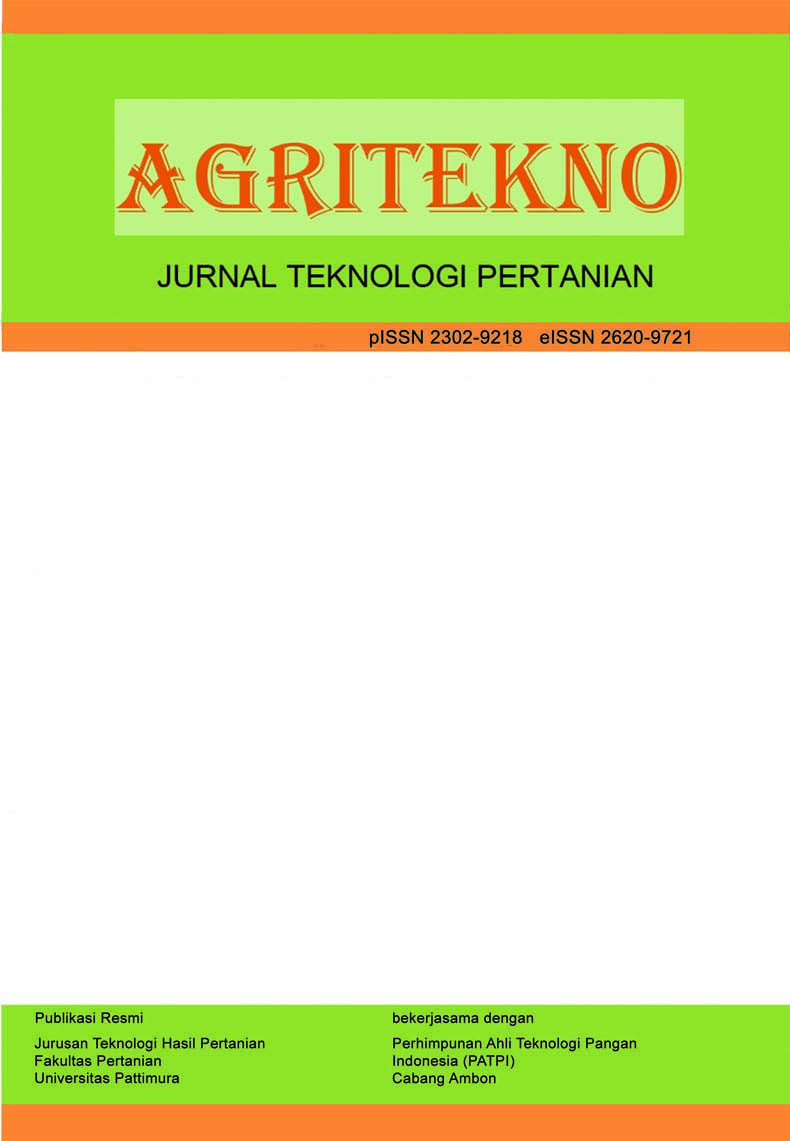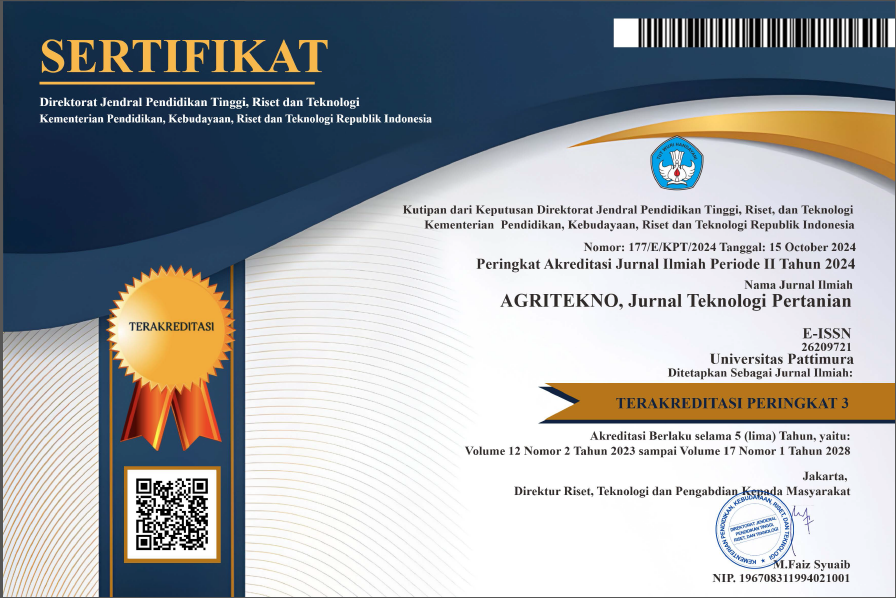Fortifikasi Kacang Gude (Cajanus cajan) pada Bagiak (Osing Etnich’s Snack) Sebagai Camilan Diet Tinggi Nutrisi
Fortification of Pigeon Pea (Cajanus cajan) in Bagiak (Osing Etnich's Snack) as a High-Nutrition Diet Snack
Abstract
Bagiak is one of the traditional cakes or snacks originating from Osing Etnich’s Snack, made from sago starch, tapioca, arrowroot starch, and flavoring. The results of a Snapchart study show that Indonesians generally choose snacks with high calories and low nutrition, which can be a severe problem. One effort that can be made to overcome this problem is fortification. Fortification of bagiak can be done by enriching the mineral, crude fiber, and protein sourced from pigeon peas (Cajanus cajan). Therefore, this study was conducted to determine the effect of adding pigeon pea flour on the nutritional content of bagiak, especially moisture content, protein, ash, crude fiber, and fat. The study used the completely randomized design method of 5 levels, including adding pigeon pea flour 0, 15, 30, 45, 60, and 75%. The test results were subjected to variance analysis and continued with DMRT. The results showed that the addition of pigeon pea flour (C. cajan) at various concentrations has a significant impact (p < 0.005) on the moisture content, protein, fat, ash, and crude fiber content of bagiak. The higher addition of pigeon pea flour was directly proportional to the increase in the nutritional content of bagiak. Adding 75% pigeon pea (G5) produced bagiak with the highest nutritional content; the protein content was 15.07%, moisture content 4.52%, ash 4.02%, crude fiber 10.96%, and fat 19.36%. The bagiak produced exceeded the quality standards set by BSN in SNI 2973:2022.
Downloads
References
Adeyanju, J.A., Alabi, O.D., Abioye, A.O., Oloyede, A.A., & Korede, O.I., (2022). Production and quality assessment of biscuit from acha flour supplemented with pigeon pea. European Journal of Nutrition & Food Safety, 14(10), 23–29. https://doi.org/10.9734/ejnfs/2022/v14i1030538
Afshin, A., Micha, R., Khatibzadeh, S., & Mozaffarian, D. (2014). Consumption of nuts and legumes and risk of incident ischemic heart disease, stroke, and diabetes: A systematic review and meta-analysis. American Journal of Clinical Nutrition, 100(1), 278–288. https://doi.org/10.3945/ajcn.113.076901
Allen, L. (2018). Quality control: water activity considerations for beyond-use dates. International Journal of pharmaceutical compounding, 22(4), 288-293. https://ijpc.com/Abstracts/Abstract.cfm?ABS=4491
Augustyn, G.H., Moniharapon, E., & Resimere, S. (2017). Analisa kandungan gizi tepung kacang gude hitam (Cajanus cajan) dengan beberapa perlakuan pendahuluan. Agritekno: Jurnal Teknologi Pertanian, 6(1), 27-32. https://doi.org/10.30598/jagritekno.2017.6.1.27
AOAC [Assosiation of Official Analytical Chemists]. (2005). Official Methods of
Analysis of the Assosiation of Official Analytical of Chemists. Arlington
Virginia (US): Assosiation of Official Analytical Chemist, Inc. https://www.researchgate.net/publication/292783651_AOAC_2005
AOAC [Assosiation of Official Analytical Chemists]. (2012). Official Method of Analysis: Association of Analytical Chemists. 19th Edition, Washington DC, 121-130. https://doi.org/10.4236/me.2015.610108
Benítez, R., Elvira Tabares, W.F., Lenis Velásquez, L.A., Hurtado Sánchez, C.I., & Salinas Cruel, O.A. (2021). Enzymatic hydrolysis as a tool to improve total digestibility and techno-functional properties of pigeon pea (Cajanus cajan) starch. Heliyon, 7(8), e07817. https://doi.org/10.1016/j.heliyon.2021.e07817
BSN. (2022). SNI Biskuit 2973:2022. Standar Nasional Indonesia.
Calista, R.A.D., Wulan, S.N., & Murtini, E.S. (2022). Pengaruh substitusi tepung terigu dengan tepung kacang gude (Cajanus cajan L.) Pada produk crackers dan potensinyauntuk makanan diet. Jurnal Pangan dan Agroindustri, 10(3), 178-186. https://doi.org/10.21776/ub.jpa.2022.010.03.6
Dai, F.J., Hsu, W.H., Huang, J.J., & Wu, S.C. (2013). Effect of pigeon pea (Cajanus cajan L.) on high-fat diet-induced hypercholesterolemia in hamsters. Food and Chemical Toxicology, 53, 384-391. https://doi.org/10.1016/j.fct.2012.12.029
Danquah, E.O., Frimpong, F., Yeboah, S., Tetteh, E.N., Weebadde, C., Ennin, S.A., Agyeman, K., Amankwaa-Yeboah, P., Akley, E.K., Hayford, P., & Snapp, S. (2022). Pigeonpea (Cajanus cajan) and white yam (Dioscorea rotundata) cropping system: Improved resource use and productivity in Ghana. Annals of Agricultural Sciences, 67(1), 60-71. https://doi.org/10.1016/j.aoas.2022.05.001
Emmanuel, N., & Dorothy, C. (2017). Effect of combined processing methods on the proximate and mineral composition of pigeon pea (Cajanus cajan) flour. International Journal of Food Science and Biotechnology, 2(3), 73-79. https://www.sciencepublishinggroup.com/article/10.11648/j.ijfsb.20170203.11
Haji, A., Teka, T.A., Bereka, T.Y., Andersa, K.N., Nekera, K.D., Abdi, G.G., Abelti, A.L., & Urugo, M.M. (2024). Nutritional composition, bioactive compounds, food applications, and health benefits of pigeon pea (Cajanus cajan L. Millsp.): A review. Legume Science, 6(2), e233. https://doi.org/10.1002/leg3.233
Herlina, Utami, E.S., Fauziah, R.R., Lindriati, T., Harsita, P.A., Wiyono, A.E., Indraningrat, K. (2022). Pengembangan usaha bagiak (jajanan khas etnis osing) melalui produksi bagiak kaya serat dan aplikasi bussines model canvas (BMC). Jurnal Hasil Pengabdian Kepada Masyarakat Universitas Jember, 1(2), 71-77. https://doi.org/10.19184/jpmunej.v1i2.211
Huang, Y.C., & Lai, H.M. (2010). Noodle quality affected by different cereal starches. Journal
of Food Engineering, 97(2), 135–143. https://doi.org/10.1016/j.jfoodeng.2009.10.002
Joyo, N. (2024). Long weekend bulan mei, pelaku UMKM dan ekonomi kreatif Banyuwangi panen omset. https://jatimtimes.com/baca/312421/20240518/185900/long-weekend-bulan-mei-pelaku-umkm-dan-ekonomi-kreatif-banyuwangi-panen-omset
Lai, Y.S., Hsu, W.H., Huang, J.J., & Wu, S.C. (2012). Antioxidant and anti-inflammatory effects of pigeon pea (Cajanus cajan L.) extracts on hydrogen peroxide- and lipopolysaccharide-treated RAW264.7 macrophages. Food and Function, 3(12), 1294–1301. https://doi.org/10.1039/C2FO30120B
Murni, N.N., Masdarini, L., & Ekayani, I.A.P.H. (2024). Pangan lokal tepung kacang gude (Cajanus cajan (L) Millsp.) dalam pembuatan brownies kukus. Jurnal Kuliner, 4(1), 54-66. https://doi.org/10.23887/jk.v4i1.75708
Onwuka, G.I. (2006). Soaking, boiling and antinutritional factors in pigeon peas (Cajanus cajan) and cowpeas (Vigna unguiculata). Journal of Food Processing and Preservation, 30(5), 616–630. https://doi.org/10.1111/j.1745-4549.2006.00092.x
Pal, D., Mishra, P., Sachan, N., & Ghosh, A.K. (2011). Biological activities and medicinal properties of Cajanus cajan (L) Millsp. Journal of Advanced Pharmaceutical Technology & Research, 2(4), 207–214. https://doi.org/10.4103/2231-4040.90874
Panchavathi, G.N., Dhyani, B.P., & Shahi, U.P. (2020). Effect of nitrogen levels and scheduling on growth and yield of pigeon pea in integrated approach. International Journal of Current Microbiology and Applied Sciences, 9(7), 1230-1238. https://doi.org/10.20546/ijcmas.2020.907.142
Parwata, M., & Mariani, G. (2022). Kacang gude (Cajanus cajan L. Huth) sumber pangan berpotensial di lahan kering. Dinas Pertanian dan Ketahanan Pangan Provinsi Bali. https://distanpangan.baliprov.go.id/kacang-gude-cajanus-cajan-l-huth-sumber-pangan-potensial-di-lahan-kering/.
Pasaribu, Y., & Praptiwi, I.I. (2014). Kandungan serat kasar centrosema pubescens dan capologonium mucunoides di Kampong Wasur. Agricola: Jurnal Pertanian, 4(1), 33-40. https://doi.org/10.35724/ag.v4i1.311
Pratiwi, S.A., Darawati, M., Widiada, I.G.N., & Irianto. (2018). Pembuatan cookies udela bebas gluten dan kasein berbahan tepung kombinasi ubi jalar ungu, kacang gude, labu kuning untuk anak autis. Jurnal Gizi Prima, 3(2), 80-85. https://doi.org/10.32807/jgp.v3i2.112
Rovalino-Córdova, A.M., Fogliano, V., & Capuano, E. (2018). A closer look to cell structural barriers affecting starch digestibility in beans. Carbohydrate Polymers, 181, 994-1002. https://doi.org/10.1016/j.carbpol.2017.11.050
Setyarini, D. (2024). Fortifikasi Protein Dan Kalsium Bagiak Khas Banyuwangi Dengan Konsentrat Protein Ikan (KPI) Dan Tepung Tulang Ikan. [Tesis]. Institut Pertanian Bogor. https://repository.ipb.ac.id/handle/123456789/139856
Susanti, A.D. & Harijono. (2014). Pengaruh karaginan terhadap karakteristik pasta tepung garut dan kecambah kacang gude sebagai bahan baku bihun. Jurnal Pangan dan Agroindustri, 4(2), 50-57. https://jpa.ub.ac.id/index.php/jpa/article/view/77
Thoha, M.Y., & Fajrin, D.E. (2010). Pembuatan briket arang dari daun jati dengan sagu aren sebagai pengikat. Jurnal Teknik Kimia, 17(1), 34-41.
Copyright (c) 2024 The Author(s)

This work is licensed under a Creative Commons Attribution-ShareAlike 4.0 International License.
Authors who publish with this journal agree to the following terms:
- Authors retain copyright and grant the journal the right of first publication with the work simultaneously licensed under a Creative Commons Attribution License that allows others to share the work with an acknowledgement of the work's authorship and initial publication in this journal.
- Authors are able to enter into separate, additional contractual arrangements for the non-exclusive distribution of the journal's published version of the work (e.g., post it to an institutional repository or publish it in a book), with an acknowledgement of its initial publication in this journal.
- Authors are permitted and encouraged to post their work online (e.g., in institutional repositories or on their website) prior to and during the submission process, as it can lead to productive exchanges, as well as earlier and greater citation of published work (See The Effect of Open Access).









